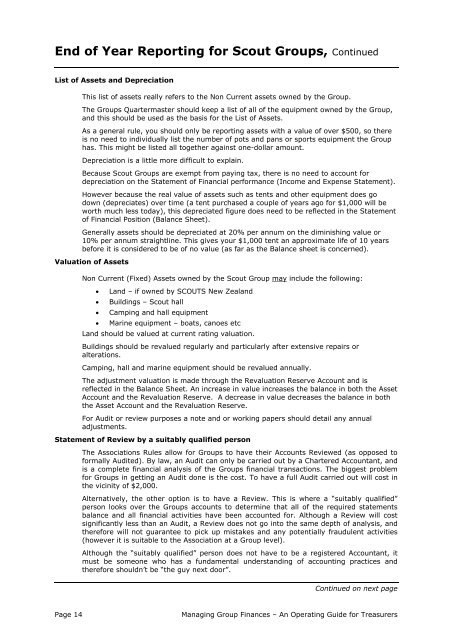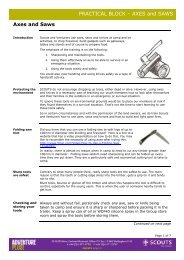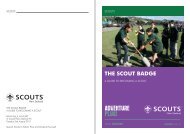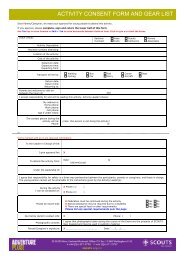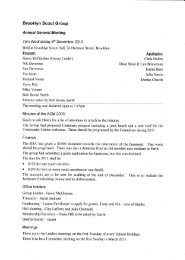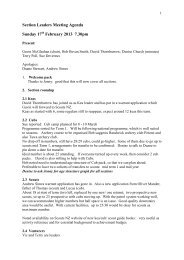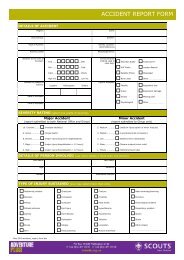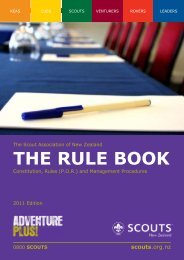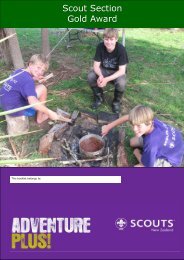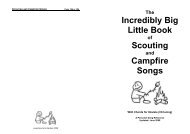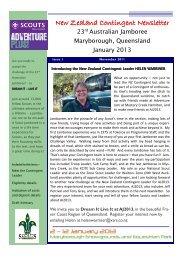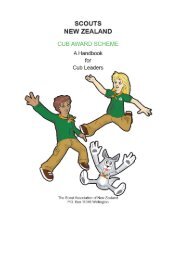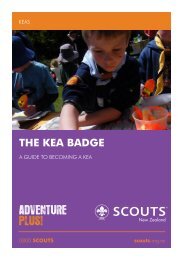managing group finances - Region 1 Scouting - SCOUTS New ...
managing group finances - Region 1 Scouting - SCOUTS New ...
managing group finances - Region 1 Scouting - SCOUTS New ...
- No tags were found...
Create successful ePaper yourself
Turn your PDF publications into a flip-book with our unique Google optimized e-Paper software.
End of Year Reporting for Scout Groups, ContinuedList of Assets and DepreciationThis list of assets really refers to the Non Current assets owned by the Group.The Groups Quartermaster should keep a list of all of the equipment owned by the Group,and this should be used as the basis for the List of Assets.As a general rule, you should only be reporting assets with a value of over $500, so thereis no need to individually list the number of pots and pans or sports equipment the Grouphas. This might be listed all together against one-dollar amount.Depreciation is a little more difficult to explain.Because Scout Groups are exempt from paying tax, there is no need to account fordepreciation on the Statement of Financial performance (Income and Expense Statement).However because the real value of assets such as tents and other equipment does godown (depreciates) over time (a tent purchased a couple of years ago for $1,000 will beworth much less today), this depreciated figure does need to be reflected in the Statementof Financial Position (Balance Sheet).Generally assets should be depreciated at 20% per annum on the diminishing value or10% per annum straightline. This gives your $1,000 tent an approximate life of 10 yearsbefore it is considered to be of no value (as far as the Balance sheet is concerned).Valuation of AssetsNon Current (Fixed) Assets owned by the Scout Group may include the following:• Land – if owned by <strong>SCOUTS</strong> <strong>New</strong> Zealand• Buildings – Scout hall• Camping and hall equipment• Marine equipment – boats, canoes etcLand should be valued at current rating valuation.Buildings should be revalued regularly and particularly after extensive repairs oralterations.Camping, hall and marine equipment should be revalued annually.The adjustment valuation is made through the Revaluation Reserve Account and isreflected in the Balance Sheet. An increase in value increases the balance in both the AssetAccount and the Revaluation Reserve. A decrease in value decreases the balance in boththe Asset Account and the Revaluation Reserve.For Audit or review purposes a note and or working papers should detail any annualadjustments.Statement of Review by a suitably qualified personThe Associations Rules allow for Groups to have their Accounts Reviewed (as opposed toformally Audited). By law, an Audit can only be carried out by a Chartered Accountant, andis a complete financial analysis of the Groups financial transactions. The biggest problemfor Groups in getting an Audit done is the cost. To have a full Audit carried out will cost inthe vicinity of $2,000.Alternatively, the other option is to have a Review. This is where a “suitably qualified”person looks over the Groups accounts to determine that all of the required statementsbalance and all financial activities have been accounted for. Although a Review will costsignificantly less than an Audit, a Review does not go into the same depth of analysis, andtherefore will not guarantee to pick up mistakes and any potentially fraudulent activities(however it is suitable to the Association at a Group level).Although the “suitably qualified” person does not have to be a registered Accountant, itmust be someone who has a fundamental understanding of accounting practices andtherefore shouldn’t be “the guy next door”.Continued on next pagePage 14Managing Group Finances – An Operating Guide for Treasurers


